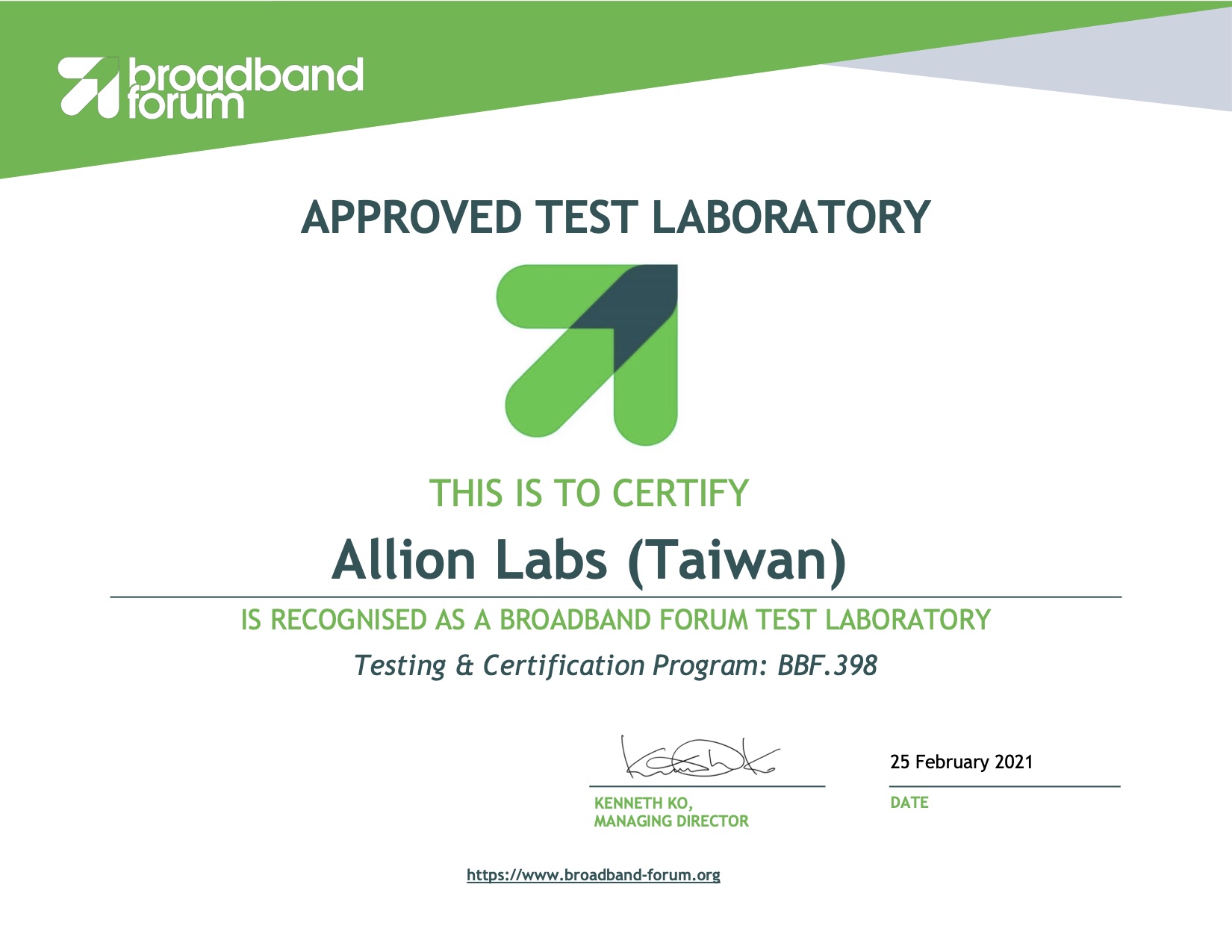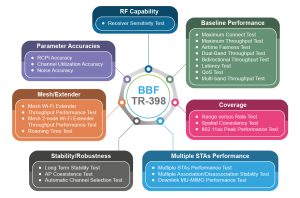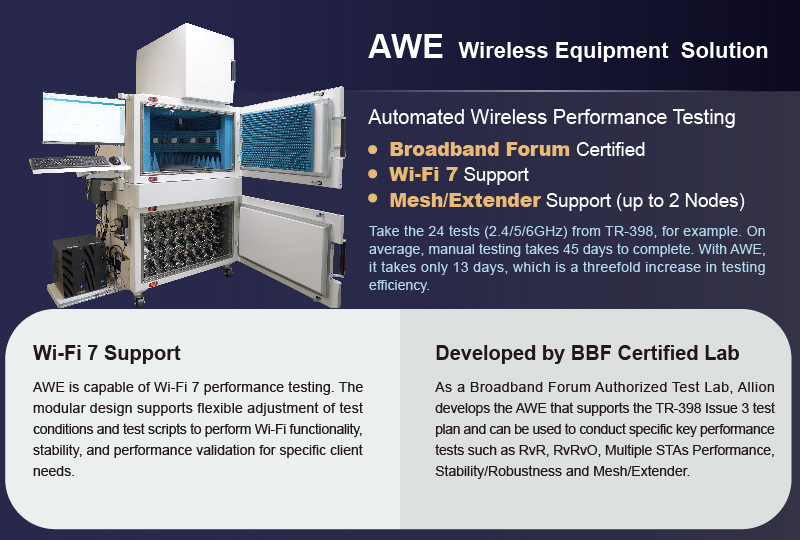
BBF.398 Test Service
BBF.398 is a test standard specifically established for measuring wireless performances in terms of 7 aspects, which are RF Capability, baseline performance, coverage, multiple STAs performance, stability/robustness, mesh/extender and parameter accuracies. Allion is an Authorized Test Lab for the Broadband Forum BBF.398 Program, and we offer the necessary equipment and years of RF experience to help you learn the overall performance of your wireless devices.
InquiryAllion is an Approved Test Laboratory for the Broadband Forum’s BBF.398 Program

What is BBF.398?
At the 2019 Mobile World Congress (MWC 2019), the Broadband Forum (BBF) launched the world’s first in-premises Wi-Fi performance standard: TR-398 (now known as BBF.398). This new standard is established to tackle issues such as slow internet connections, insufficient coverage, and interferences that will affect user experiences.
BBF.398 is the next generation of WT-398 and was mainly established to qualify the performances of 802.11n/ac/ax (Wi-Fi 4, Wi-Fi 5, Wi-Fi 6) based routers.
With the growth of Wi-Fi 6E, the Broadband Forum (BBF) approved the third revision of the TR-398 at the end of February 2024. Issue 3 of this test plan makes the following key changes to systematically and quantitatively evaluate the DUT performance:
- Addition of testing for 6GHz to the applicable test cases
- New test cases, including “Latency Test”, “Quality of Service (QoS)”, “Multi-Band Throughput Test”, and more
- New test cases for mesh networks
Test cases are categorized into the following 7 aspects:

Allion provides one-stop testing to enhance the performance of your wireless devices
Allion’s test labs and facilities are designed to meet the performance testing requirements of wireless devices. Our testing equipment and wireless testing chambers can help vendors verify their products in the following seven aspects, for a total of 24 tests, as stated by the Broadband Forum.
| Performance Tests | # | Test Cases | Mandatory/ Optional | Test Description |
|---|---|---|---|---|
| RF Capability | 6.1.1 | Receiver Sensitivity Test | Optional | This test intends to measure the minimum signal strength that a receiver can detect, providing a simplified measurement of the receiver’s sensitivity, relative to the total attenuation inserted between the DUT (AP) and the STA. |
| Baseline Performance | 6.2.1 | Maximum Connection Test | Mandatory | This test intends to verify that the DUT (AP) can support 32 STAs simultaneously connected with minimal packet loss and no disassociations taking place. |
| 6.2.2 | Maximum Throughput Test | Mandatory | This test intends to measure the maximum throughput performance of the DUT (AP). | |
| 6.2.3 | Airtime Fairness Test | Mandatory | This test intends to verify the capability of the DUT to guarantee the fairness of airtime usage. 3 stations are utilized in the test, with one running as an 802.11a/g device. | |
| 6.2.4 | Dual-band Throughput Test | Mandatory | Measure the throughput the DUT can support when concurrently connected to multiple stations on both the 2.4 and 5 GHz bands, or the 5 and 6 GHz bands, each operating with two spatial streams. | |
| 6.2.5 | Bidirectional Throughput Test | Mandatory | This test measures the uplink and downlink simultaneously achieved through the DUT and a station. | |
| 6.2.6 | Latency Test | Mandatory | This test intends to verify that latency and throughput performs well under low, high, and maximum AP traffic load, with the DUT (AP) and multiple Wi-Fi stations. | |
| 6.2.7 | QoS Test | Optional | This test verifies the capability of the DUT to ensure higher QoS stream gets more priority than the lower QoS stream, while maintaining good over-all throughput. | |
| 6.2.8 | Multi-Band Throughput Test | Conditional Mandatory | This test measures the throughput the DUT can support when concurrently connected to multiple stations on all the 2.4, 5 and 6 GHz bands. | |
| Coverage | 6.3.1 | Range Versus Rate Test | Mandatory | This test measures the baseband and RF chain performance of the DUT (AP) at different signal levels. |
| 6.3.2 | Spatial Consistency Test | Mandatory | Spatial consistency verifies the Wi-Fi signal consistency in spatial domain. | |
| 6.3.3 | 802.11ax Peak Performance Test | Conditional Mandatory | This test case examines the maximum performance expected from a DUT supporting 802.11ax with 4 spatial streams. | |
| Multiple STAs Performance | 6.4.1 | Multiple STAs Performance Test | Optional | This test intends to measure the performance of Wi-Fi devices connected with multiple STAs simultaneously. |
| 6.4.2 | Multiple Association/Disassociation Stability Test | Mandatory | Measures the stability of 16 Wi-Fi STAs under a dynamic environment with frequent change of connection status (connection/disconnection). | |
| 6.4.3 | Downlink MU-MIMO Performance Test | Conditional Mandatory | This test intends to verify the performance of the Wi-Fi device when Downlink MU-MIMO is applied. The test is only applicable to the Wi-Fi device supporting the 802.11ac/ax. | |
| Stability/Robustness | 6.5.1 | Long Term Stability Test | Mandatory | Confirm the wireless transmission stability of the DUT during long-term operation (24 hours). |
| 6.5.2 | AP Coexistence Test | Mandatory | This test intends to verify the performance of the DUT with existence of alien AP. | |
| 6.5.3 | Automatic Channel Selection Test | Optional | The test verifies the DUT (AP) will select a Wi-Fi channel that is not presently utilized by other networks and will alter this channel on subsequent reboots, if the environment has changed. | |
| Mesh/Extender | 6.6.1 | Mesh Extender Wi-Fi Throughput Performance Test | Optional | This test case measures the throughput performance of a mesh Wi-Fi system, where the Wi-Fi Extender is at different emulated distances from the Root AP. |
| 6.6.2 | Mesh 2-node Repeater Wi-Fi Throughput Performance Test | Optional | This test case measures the throughput performance of a mesh Wi-Fi system where the Wi-Fi Extenders are at different emulated distances from the Root AP and each other. | |
| 6.6.3 | Roaming Time Test | Optional | This test case measures the time it takes to roam between Wi-Fi connections of the “Root AP” and the “Wi-Fi Extender.” | |
| Parameter Accuracies | 7.1.1 | RCPI Accuracy | Conditional Mandatory | This test measures the relative accuracy of RCPI as reported by the DUT (AP). |
| 7.1.2 | Channel Utilization Accuracy | Conditional Mandatory | The test provides a measurement of the accuracy of channel utilization as reported by the DUT. Several levels of traffic are injected to test different channel utilizations. | |
| 7.1.3 | Noise Accuracy | Conditional Mandatory | This test provides a measurement of the accuracy of noise levels as reported by the DUT (AP). | |
| Appendix | Multiple STAs Multicast Performance Test | Optional |
The abovementioned test cases are excerpted from Wi-Fi Residential & SOHO Performance Testing, Issue 3 approved in February 2024. For information on the BBF.398 test program, please contact us at service@allion.com.
Wireless Testing Equipment: Allion Wireless Equipment (AWE)
Allion Wireless Equipment (AWE) is a wireless testbed developed by Allion. It supports testing of the performance and standards of wireless devices, including the BBF.398 test program. AWE incorporates small shielding boxes and attenuators that enable the simulation of distance and environmental variables. This design helps achieve necessary test variables for a variety of performance tests and reproduce consistent test results, which is beneficial for debugging and analyzing issues. In addition, AWE allows for control path switching between boxes through its automation software, significantly shortening set-up time and simplifying the testing process. AWE also supports Wi-Fi mesh tests and the latest technologies, such as Wi-Fi 7 (802.11be). For more information, please click on the link below:

Tests supported by AWE:
| ◆ TR-398 | ◆ Airtime Fairness |
| ◆ RvR (160/320MHz MIMO RvR) | ◆ QoS |
| ◆ RvRvO (160/320MHz MIMO RvR) | ◆ Stability (Long Time/ Client Dynamic Operation) |
| ◆ Coexistence RvR | ◆ Channel Selection |
| ◆ Multiple Bands Throughput | ◆ Maximum Client Connection |
| ◆ Multiple Client Throughput | ◆ MU-MIMO Capability |
| ◆ Bidirectional Throughput | ◆ Support Wi-Fi 7 |
| ◆ Mesh (up to 2 Nodes) Throughput |
For more validations for wireless devices, please visit:































